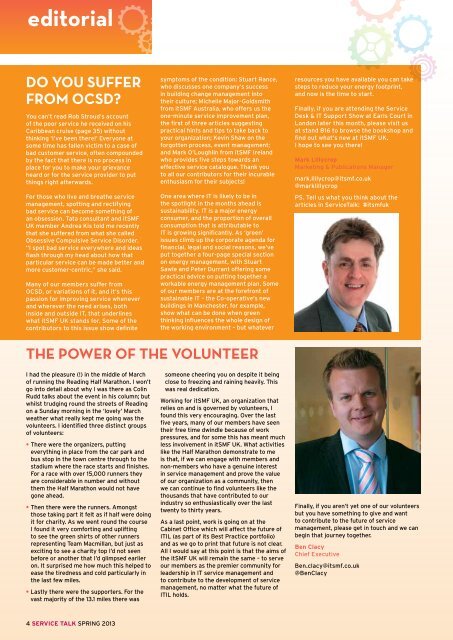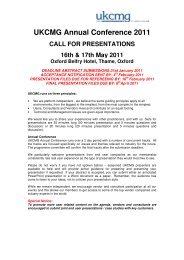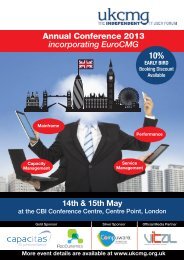SerVICe management - UKCMG
SerVICe management - UKCMG
SerVICe management - UKCMG
Create successful ePaper yourself
Turn your PDF publications into a flip-book with our unique Google optimized e-Paper software.
editorial<br />
Do you suffer<br />
from OCSD?<br />
You can’t read Rob Stroud’s account<br />
of the poor service he received on his<br />
Caribbean cruise (page 35) without<br />
thinking ‘I’ve been there!’ Everyone at<br />
some time has fallen victim to a case of<br />
bad customer service, often compounded<br />
by the fact that there is no process in<br />
place for you to make your grievance<br />
heard or for the service provider to put<br />
things right afterwards.<br />
For those who live and breathe service<br />
<strong>management</strong>, spotting and rectifying<br />
bad service can become something of<br />
an obsession. Tata consultant and itSMF<br />
UK member Andrea Kis told me recently<br />
that she suffered from what she called<br />
Obsessive Compulsive Service Disorder.<br />
“I spot bad service everywhere and ideas<br />
flash through my head about how that<br />
particular service can be made better and<br />
more customer-centric,” she said.<br />
Many of our members suffer from<br />
OCSD, or variations of it, and it’s this<br />
passion for improving service whenever<br />
and wherever the need arises, both<br />
inside and outside IT, that underlines<br />
what itSMF UK stands for. Some of the<br />
contributors to this issue show definite<br />
symptoms of the condition: Stuart Rance,<br />
who discusses one company’s success<br />
in building change <strong>management</strong> into<br />
their culture; Michelle Major-Goldsmith<br />
from itSMF Australia, who offers us the<br />
one-minute service improvement plan,<br />
the first of three articles suggesting<br />
practical hints and tips to take back to<br />
your organization; Kevin Shaw on the<br />
forgotten process, event <strong>management</strong>;<br />
and Mark O’Loughlin from itSMF Ireland<br />
who provides five steps towards an<br />
effective service catalogue. Thank you<br />
to all our contributors for their incurable<br />
enthusiasm for their subjects!<br />
One area where IT is likely to be in<br />
the spotlight in the months ahead is<br />
sustainability. IT is a major energy<br />
consumer, and the proportion of overall<br />
consumption that is attributable to<br />
IT is growing significantly. As ‘green’<br />
issues climb up the corporate agenda for<br />
financial, legal and social reasons, we’ve<br />
put together a four-page special section<br />
on energy <strong>management</strong>, with Stuart<br />
Sawle and Peter Durrant offering some<br />
practical advice on putting together a<br />
workable energy <strong>management</strong> plan. Some<br />
of our members are at the forefront of<br />
sustainable IT – the Co-operative’s new<br />
buildings in Manchester, for example,<br />
show what can be done when green<br />
thinking influences the whole design of<br />
the working environment – but whatever<br />
resources you have available you can take<br />
steps to reduce your energy footprint,<br />
and now is the time to start.<br />
Finally, if you are attending the Service<br />
Desk & IT Support Show at Earls Court in<br />
London later this month, please visit us<br />
at stand 816 to browse the bookshop and<br />
find out what’s new at itSMF UK.<br />
I hope to see you there!<br />
Mark Lillycrop<br />
Marketing & Publications Manager<br />
mark.lillycrop@itsmf.co.uk<br />
@marklillycrop<br />
PS. Tell us what you think about the<br />
articles in ServiceTalk: #itsmfuk<br />
THE POWER OF THE VOLUNTEER<br />
I had the pleasure (!) in the middle of March<br />
of running the Reading Half Marathon. I won’t<br />
go into detail about why I was there as Colin<br />
Rudd talks about the event in his column; but<br />
whilst trudging round the streets of Reading<br />
on a Sunday morning in the ‘lovely’ March<br />
weather what really kept me going was the<br />
volunteers. I identified three distinct groups<br />
of volunteers:<br />
• There were the organizers, putting<br />
everything in place from the car park and<br />
bus stop in the town centre through to the<br />
stadium where the race starts and finishes.<br />
For a race with over 15,000 runners they<br />
are considerable in number and without<br />
them the Half Marathon would not have<br />
gone ahead.<br />
• Then there were the runners. Amongst<br />
those taking part it felt as if half were doing<br />
it for charity. As we went round the course<br />
I found it very comforting and uplifting<br />
to see the green shirts of other runners<br />
representing Team Macmillan, but just as<br />
exciting to see a charity top I’d not seen<br />
before or another that I’d glimpsed earlier<br />
on. It surprised me how much this helped to<br />
ease the tiredness and cold particularly in<br />
the last few miles.<br />
• Lastly there were the supporters. For the<br />
vast majority of the 13.1 miles there was<br />
someone cheering you on despite it being<br />
close to freezing and raining heavily. This<br />
was real dedication.<br />
Working for itSMF UK, an organization that<br />
relies on and is governed by volunteers, I<br />
found this very encouraging. Over the last<br />
five years, many of our members have seen<br />
their free time dwindle because of work<br />
pressures, and for some this has meant much<br />
less involvement in itSMF UK. What activities<br />
like the Half Marathon demonstrate to me<br />
is that, if we can engage with members and<br />
non-members who have a genuine interest<br />
in service <strong>management</strong> and prove the value<br />
of our organization as a community, then<br />
we can continue to find volunteers like the<br />
thousands that have contributed to our<br />
industry so enthusiastically over the last<br />
twenty to thirty years.<br />
As a last point, work is going on at the<br />
Cabinet Office which will affect the future of<br />
ITIL (as part of its Best Practice portfolio)<br />
and as we go to print that future is not clear.<br />
All I would say at this point is that the aims of<br />
the itSMF UK will remain the same – to serve<br />
our members as the premier community for<br />
leadership in IT service <strong>management</strong> and<br />
to contribute to the development of service<br />
<strong>management</strong>, no matter what the future of<br />
ITIL holds.<br />
Finally, if you aren’t yet one of our volunteers<br />
but you have something to give and want<br />
to contribute to the future of service<br />
<strong>management</strong>, please get in touch and we can<br />
begin that journey together.<br />
Ben Clacy<br />
Chief Executive<br />
Ben.clacy@itsmf.co.uk<br />
@BenClacy<br />
4 SERVICE TALK SPRING 2013




